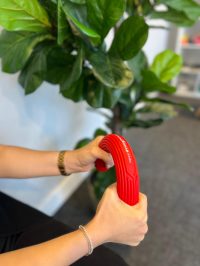A hand therapist is a registered occupational therapist or physiotherapist who has undergone additional postgraduate training and gained clinical experience in treating conditions affecting the upper limb.
To practise, they must be accredited by the Australian Health Practitioner Regulation Agency (AHPRA). Many hand therapists also pursue further education or certifications specific to hand and upper limb therapy, reflecting their high level of specialised knowledge.
Despite what the name might suggest, hand therapists do not treat only the hand. They are trained to manage issues involving the entire upper limb. This includes the fingers, hand, wrist, forearm, elbow, and sometimes even the shoulder. Their role is essential in helping people recover from injuries, adapt to chronic conditions, and return to everyday activities as safely and efficiently as possible.
Hand therapists work with people of all ages, from children with congenital conditions to older adults recovering from surgery or managing arthritis. They see patients with a wide range of injuries, including fractures, tendon or ligament tears, nerve compressions (like carpal tunnel syndrome), and joint dislocations. They also manage repetitive strain injuries such as “tennis elbow” or “mother’s wrist”, and are often involved in post-operative rehabilitation following procedures such as tendon repairs, nerve grafts, or joint replacements.
People with chronic conditions such as arthritis, nerve injuries, or congenital differences can also benefit from hand therapy. Through ongoing support, education, and intervention, hand therapists can help reduce pain, improve functional ability, and enhance independence in daily tasks.
So…what happens during a hand therapy appointment?

When you attend your first session, your hand therapist will begin by getting to know you and your story. They’ll ask how long you have had your condition or how your injury happened (and discuss any relevant surgery). They will determine the nature of your symptoms, how the issue is affecting your work, hobbies, or daily routines, and what activities you’re hoping to return to. Whether your goals are as simple as brushing your hair, typing on a keyboard, or as specific as playing an instrument or returning to sport, your input is a vital part of the therapy process.
This is followed by a comprehensive assessment, where your therapist may examine the area for swelling, stiffness, scar tissue, or muscle weakness. They’ll often assess your range of motion, grip strength, sensation and special tests depending on your condition. This assessment helps them understand your current status and develop a treatment plan that suits your specific needs.
Treatment is highly individualised and can involve a wide variety of approaches. Your therapist might create a custom splint or brace to support or protect an area, prescribe targeted exercises to build strength and flexibility, or use hands-on techniques such as massage, stretching, or joint mobilisation. Education is also a major component. Your therapist will often provide advice on how to modify everyday activities, set up your workstation ergonomically, or manage tasks at home in a way that supports healing.
Importantly, hand therapy is a collaborative process. While hand therapists bring extensive knowledge and experience, they always consider the patient’s own insights. After all, you are the expert in your body and how it feels.
Another key benefit of working with a hand therapist is their close collaboration with other healthcare providers. They often liaise with your surgeon, GP, specialist, or case manager to make sure everyone is aligned on your treatment goals and progress, ensuring a more seamless and effective recovery.
Hand therapists also play a crucial preventative role by monitoring for complications like infection, helping to prevent joint deformities, and reducing the risk of long-term degeneration or loss of function.
Whether you’re recovering from surgery, managing an overuse injury, or seeking help for a long-standing issue, hand therapy can support you in getting back to doing the things you love.
Comments are closed
